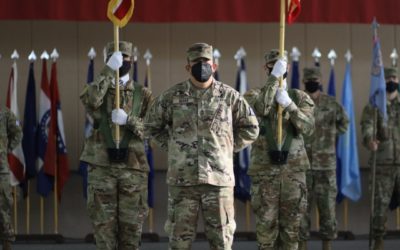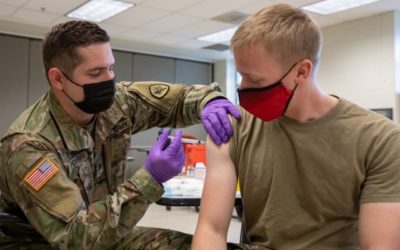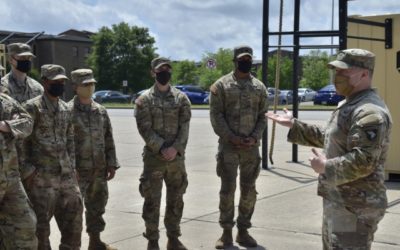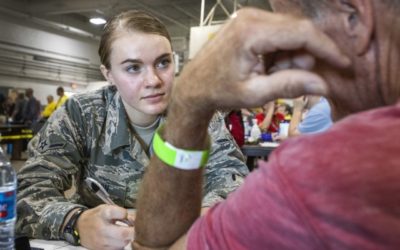For women serving in challenging environments with limited access to clean water, sanitation and medical facilities, knowing how to prevent, diagnose and treat urogenital infections is essential.
Air Force Women’s Health Initiative Takes Off
With women accounting for more than 15% of all active duty forces, the health needs of women are increasingly coming to the fore. Women represent nearly 21% of the Air Force, making addressing their unique needs particularly critical for mission readiness. In response, the service has introduced a growing number of health initiatives through the Women’s Initiative Team’s (WIT) Female-Specialized Health Care Programs.
VA Increases Focus on Needs of Younger Women Patients
The Deborah Sampson Act represented a major advance for women’s health care at the VA, an area long neglected despite the steady rise in the number of women serving in the U.S. military over the last several decades.
New Concerns, New Treatments for Vulvovaginal Candidiasis
Candida, a common yeast, frequently cohabitates on skin and inside the body and typically causes little trouble. When conditions enable it to multiply rapidly or when drug-resistant strains take hold, however, it can cause a range of problems, including vulvovaginal candidiasis, one of the most common infections in women.
VA Study Questions Value of Remdesivir in Hospitalized COVID-19 Patients
Last October, the Food and Drug Administration approved remdesivir, marketed as Veklury, for use in adults and children 12 and older who weight at least 40 kg for the treatment of COVID-19 requiring hospitalization.
VHA Observational Study Finds No Links Between Testosterone, CV Events
Hormone replacement therapy can have a number of beneficial effects—improving libido and sexual function, lifting energy and mood, increasing muscle mass and bone mineral density and decreasing fat mass—in men with low levels of testosterone, according to studies.
TAPS Can Be the Start of Something Good for Veterans with Essential Tremor
Veterans are used to the sound of Taps marking an end. For a growing number, TAPS may indicate the beginning of a road to recovery of independence.
What Soldiers Are Most at Risk of Acting on Suicide Ideation?
The statistics are alarming. More soldiers die from self-inflicted gunshot wounds than combat injuries. Eighty-three percent of firearm deaths in the military are from suicide.
Rotation to Buprenorphine Effective for Pain Patients
Does rotation of buprenorphine from full μ-opioid receptor agonists improve pain-related outcomes and lessen adverse effects in patients with chronic pain and long-term use of narcotics?
Heart Failure Complicates VA Pain Prescribing
Pain and heart failure are highly comorbid, which can create problems for clinicians attempting to control the conditions.
Mixed Results for Discontinuing Chronic Opioid Therapy at VHA
While discontinuing chronic opioid therapy in veterans appears to be associated with decreased diagnoses for opioid-related adverse outcomes, the association with substance use disorders appears to be inconclusive, according to a new study.
For Veterans With Cancer, Teleoncology Offers High Patient Satisfaction
Approximately 50,000 U.S. military veterans are diagnosed with cancer annually, representing 3% of all cancers across the nation.
Cancer Patients Have Better Survival With Military Health Service Care
MHS provides universal healthcare to beneficiaries, reducing barriers to medical care access. That appears to be especially beneficial for military beneficiaries facing a colon cancer diagnosis and treatment.
Seizures Appear to Signal Worse Cognition in TBI Patients
For hospitalized patients with moderate to severe traumatic brain injuries, more than half have seizures and abnormal periodic or rhythmic patterns observed on continuous electroencephalography monitoring (cEEG).
Battlefield Blast Exposure Linked to Mental Health Effects
Chronic mental health symptoms including post-traumatic stress, depression and neurobehavioral issues increase proportionately with blast exposure severity, according to a new study.
New Focus Is on Taking Care of Victims of Military Sexual Assault
As DoD officials look to make good on President Joe Biden’s promise to address sexual assault and harassment in the military, they are framing a portion of that effort in terms of a pressing public health need.
More Epilepsy Counseling, Education Needed at VA
While care of epilepsy patients tends to be high quality at the VHA, not enough emphasis is placed on education and counseling, according to a new study.
Military Bases Add Additional Restrictions to Help Stem COVID-19 Spread
U.S. military bases around the country—and some around the world—have begun to increase health protection measures to guard against the surge in COVID-19 cases due to variants, such as delta, that have been spreading for months.
Immunologic Resistance Used to Predict COVID-19 Outcomes in Veterans
Is it possible to predict which COVID-19 patients will advance to severe disease? A new study involving VA researchers suggested that the answer is “yes,” using the concept of immunologic resilience.
Military Sets Deadlines for Receipt of Mandatory COVID-19 Vaccine
By mid-December, all U.S. active-duty servicemembers will either be vaccinated against COVID-19 or have received an approved exemption from their service branch.
Patients With Uncontrolled HIV Face Higher Risk of Sudden Cardiac Death
A new veterans study underscored the critical need for viral suppression and heart disease risk factor modification among HIV patients. Researchers determined that those with sustained viremia or low CD4 cell counts had an excess risk of sudden death.
Racial and Ethnic Disparities Identified in Rates of Severe Influenza
Marked racial and ethnic disparities in COVID-19-associated morbidity and mortality have raised important questions about racial and ethnic differences associated with other respiratory viral infections, including influenza.
Lang Tests Alternative Methods to Help Veterans Recover From PTSD
Every veteran suffering from post-traumatic stress disorder has a different experience—a different collection of symptoms, interacting in ways unique to that veteran’s life and experience.
Veteran Suicides Dropped in Latest Statistics, Reversing Steady Increases
According to VA’s 2021 National Veteran Suicide Prevention Annual Report, veteran suicides dropped in 2019, reversing the steady rise seen in previous years.
White River Junction VAMC Pilots WHO Suicide Prevention Program at VA
After 18 months of pandemic disruption and isolation, International organizations are urging governments, health systems and nonprofits to prioritize suicide prevention. The VA may have just the program.
Navy Study Suggests Post COVID-19 Symptoms Can Affect Military Readiness
At 0.2% percent, the military’s current COVID-19 mortality rate is far lower than that of the general American public, which is just under 2%. But often those who contract and survive COVID-19 have to live with its long-term effects, regardless of the severity of their acute illness.
Veterans Study Finds That Kidney Disease Is Common ‘Long COVID’ Outcome
Patients who recover from COVID-19 often suffer long-term consequences. One of the most dangerous, according to a new veterans’ study, is the detrimental effects on kidney function, which might affect hundreds of thousands of survivors.
Too Few Veterans Get Concurrent Chemoradiation Therapy for Stage III NSCLC
Compared to the general U.S. population, VHA patients tend to be older, have lower levels of income and education and have a higher comorbidity burden.
With a National Housing Crisis, Veteran Homelessness Remains a Concern
From 2010 to 2016, the number of veterans living on the streets dropped by half and the ending veteran homelessness within a decade appeared feasible.
Challenges in Optimizing Therapy for Older Veterans With Stage 1 NSCLC
According to a recent report, 30% of VHA patients qualified for lung cancer screening and reported at least two significant comorbidities.






